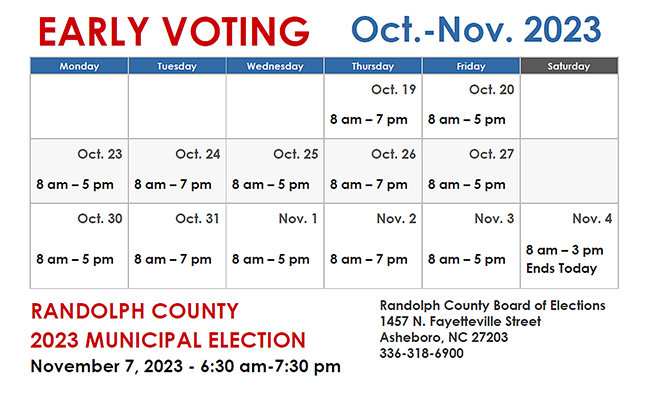Welcome!

Election law changes here and on the horizon
ASHEBORO — Major changes to the North Carolina election laws have been sent by the General Assembly to Gov. Roy Cooper’s desk.
Over the weekend, Cooper vetoed the latest legislation, but the Republican-controlled legislature has enough members to override a rejection by the governor, and has done so more than a dozen times this session.
Senate Bill 747 was passed by both houses of the General Assembly and sent to the governor on Aug. 17. The changes, if they stand, would go into effect for the 2024 general election.
Proposed changes
The proposed changes are as follows:
— Eliminates the current grace period that allows mail-in ballots arriving three days after election day to be counted if they are postmarked by the election date. Under the new law, mail-in ballots would have to be received at the local board of elections by 7:30 p.m. on Election Day.
— Prevents state and county election boards from accepting any private monetary donations to assist in administering elections. In previous elections, grants from nonprofit organizations have been used to help cover the costs of receiving and counting votes.
— Changes the current same-day registration rules during early voting periods. Under the new law, same-day registrants have to use a “retrievable ballot” that can be discarded if the county board can’t verify their address.
In addition, if the US Postal Service returns the first notice required under state statute as undeliverable before the close of business on the business day before the canvass, the county board shall not register the applicant and shall retrieve the applicant’s ballot and remove that ballot’s votes from the official count.
It would also eliminate the requirement for early voters to sign an absentee request application. The reasoning is said to be that, since most voters now go to the polls during early voting, the early voting statutes would now more reflect election day statutes.
— Permits partisan poll watchers to use electronic devices to take notes, to listen to conversations between voters and election officials, observe opening and closing procedures, and move freely around the voting area.
Photo IDs required
The 2023 election already will require voters to show photo IDs. The identifications allowed include:
— North Carolina driver’s license.
— State ID issued by the NC Department of Motor Vehicles.
— Out-of-state driver’s license or non-driver’s license if voter registered in North Carolina within 90 days of the election.
— US passport or passport card.
— North Carolina voter photo ID issued by a county board of elections.
— College or university student ID approved by the State Board of Elections.
— State or local government or charter school employee ID approved by the State Board of Elections.
Note: A voter 65 or older may use an expired form of acceptable ID if the ID was unexpired on their 65th birthday.
— Military or veterans ID card issued by the US government.
— Tribal enrollment card issued by a tribe recognized by the State or federal government.
— ID card issued by an agency of the US government or the State of North Carolina for a public assistance program.
Voters who vote by mail must include a photocopy of an acceptable ID inside the “photo ID envelope” that comes with their ballot. Or they may complete an ID Exception Form with the absentee ballot return envelope.
Early voting period set
The early voting period has been announced for the Randolph County 2023 Municipal Elections. All early voting will take place at the Randolph County Board of Elections, 1457 N. Fayetteville St., Asheboro. Early voting begins Thursday, Oct. 19, and runs through Saturday, Nov. 4, at 3 p.m.
The Board of Elections has chosen to expand early voting hours on each Tuesday and Thursday during the period to allow working people more time to come to the polls. State law requires early voting to be from 8 a.m.-5 p.m. but adding two hours to Tuesdays and Thursdays is expected to help those working until 5 p.m.
